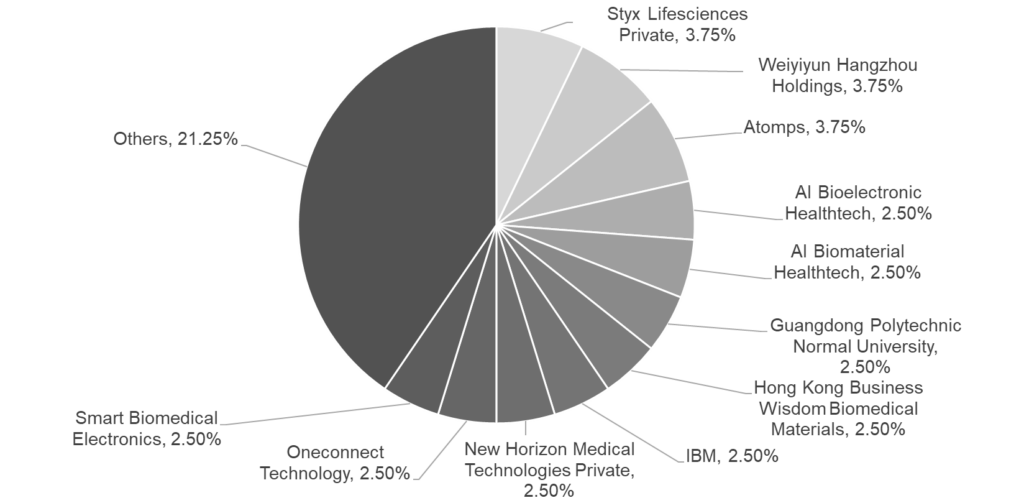Blockchain In Pharma: Transparency and Tracing Solutions
Blockchain Technology has already proven its applicability by bringing a great revolution in the supply chain of products by adding transparency and traceability and eliminating third-party intervention in the supply chain process. The technology performs secure and reliable distribution of products using smart contracts.
However, that’s not all. There’s more to it than meets the eye! Various application benefits have found their way into the supply chain process of the pharmaceutical industry.
Many companies and universities are conducting research to advance blockchain implementation in pharmaceuticals. Let’s explore the how and why behind this.
Technology Overview
The pharmaceutical industry faces a major challenge related to transparency, product tracking, trust issues, and delivery-related problems, like supply chain monitoring. Therefore, blockchain in pharma is essential in providing solutions to these problems.
Workflow
It needs to collaborate with the pharmaceutical industry’s process to implement blockchain in the pharmaceutical sector. The workflow of blockchain is described below, covering the various entities and systems that are involved during the process:

- In the first step, the blockchain performs identification, and major stakeholders, such as the FDA, suppliers, manufacturers, etc., are in the process.
- After identifying the stakeholders, in the second step, the identification and definition of relationships between stakeholders, on-chain resources, smart contracts, and decentralized storage system are performed.
- Thirdly, we use smart contracts technology to achieve real-time, seamless traceability with push notifications to minimize human intervention and undesired delays. Specifically, each drug Lot is assigned a unique smart contract that generates an event whenever a change in ownership occurs. A list of events is delivered to the DApp user.
- After defining relationships between different blockchain entities, smart contracts are used to achieve real-time and seamless traceability, eliminating the need for human interference and thus minimizing the delay. Every new lot of drugs or medicines is assigned a unique smart contract. The smart contract generates an event when there is a change in ownership. The list of events is transferred to the user using Decentralized apps (DApp).
Need of Blockchain in Pharma
Blockchain technology enables decentralization, transparency, trust, anonymity, and stability. These characteristics of blockchain technology make it an essential and useful way to make drug production and distribution more trustworthy and free of counterfeiting. Tracing the origin of pharmaceuticals, drug transportation, and raw material procurement can easily be traced using blockchain. The number of intermediaries involved in the pharmaceutical process is also reduced using blockchain technology, which will also reduce costs and improve the safety of pharmaceuticals.
Advantages of Blockchain in Pharma
Counterfeit drug prevention
Blockchain can help to prevent counterfeit drugs by significantly enhancing the security and transparency of supply chains. Using blockchain will increase the supply chain’s security and transparency in the pharmaceutical industry’s production. The blockchain can easily trace the flow of medical goods from manufacturing to delivery. Thus, it will be able to prevent the counterfeiting of drugs.
- The movement of medicines from one party to another is easily visible and traceable to all authorized members.
- The consumer can easily verify the authentication of the purchased medications by scanning the QR code or bar code of the drugs or medicines.
- The consumer can easily check for the details related to the manufacturer and other details to check the authenticity of the drug, thus preventing drug counterfeiting.
Use Cases
- Sanofi, Roche, McKesson, and Walmart have collaborated to introduce a blockchain-based MediLedger project to prevent counterfeit drugs.
- Zuellig Pharma has aimed to use blockchain to collect data securely. A smartphone app named eZTracker was developed to authenticate a drug. By scanning a barcode placed over the drug, the authenticity of the drug is verified, which helps prevent counterfeiting.
Product Distribution
The delivery of drugs from the manufacturer to the patient involves various steps that need to be tracked to properly distribute the products after each transaction. For monitoring product distribution, blockchain can be used to keep track of the events that occurred during the distribution of the drugs. This tracking of goods will help prevent the loss of goods. Also, it can enhance transparency and trust in the product distribution process.
Use Cases
- Infosys Pharma has developed an application that provides a pre-configured blockchain network for improving supply monitoring and enhancing quality control of medicine. It tracks the transactional data of immutable recopharma supply chain records as the certification of raw materials and drugs.
- Sonoco has created a platform using blockchain technology named PharmaPortal™ to improve transparency and traceability across the pharmaceutical supply chain.
Tracking and tracing
Blockchain technology can help in tracking and tracing in the following ways:
- The distribution of substandard and expiry-date drugs can affect patients’ health. Therefore, blockchain technology is a savior that prevents the supply of substandard or expired drugs.
- The introduction of the supply chain for tracing and tracking drugs will also help prevent the loss of drugs during supply. Moreover, it will aid in monitoring the conditions of the medicines during supply, thus preventing the supply of damaged drugs or medicines.
Use Cases
- Viant will collaborate with GlaxoSmithKline to deploy blockchain faster in the supply chain system. This will help track medicines from production to delivery.
- Pfizer and Eli Lilly have collaborated to develop a blockchain-based system to track prescription drugs across the supply chain. It can aid in better halting the flow of damaged and counterfeit medicines.
Security
Introducing blockchain can provide security to medical data in the following ways:
- The blockchain architecture consists of a set of immutable data blocks arranged in sequence and timestamped.
- Each block consists of a hash function, the digital fingerprint of data.
- Since all blockchain transactions are timestamped and immutable, blockchain technology can help preserve the integrity and reliability of drug data.
Use Case
- A consortium of major companies named PharmaLedger has collaborated with the Global Legal Entity Identifier Foundation (GLEIF) to create a digital ID for healthcare and pharma businesses.
- The “verifiable Legal Entity Identifier”’ (vLEI) will be used in PharmaLedger’s blockchain platform so that only authentic healthcare or drug development businesses can use the online platform, and carry out transactions. This will enhance the security of patients and drug details and data.
Blockchain in Pharma: IP Progress and Research Development

For the introduction of blockchain technology in the pharmaceutical industry, various companies and universities are constantly working. Moreover, they want to provide advanced methods and solutions related to the introduction of blockchain in the pharmaceutical Industry. Many universities also conduct various research to remove shortcomings in introducing blockchain technology in the pharmaceutical industry. Some of them are mentioned in the pie chart.
Hyperledger Fabric-Enabled Drug Traceability System
The University of Brunei Darussalam researchers have proposed a novel track-and-trace blockchain-enabled Medledger system that leverages the Hyperledger Fabric blockchain platform using smart contracts. The system performs transactions in fabric-enabled distributed network more securely and efficiently. The traceability solution eliminates the need for third-party interference and protects the details related to the transaction of data in a more secure and trusted manner.
The information related to activities, events, and transactions is stored and recorded using various decentralized storage systems such as IPFS, Swarm, filecoin, etc., to provide maximum transparency and traceability.
Smart Tracking and Tracing Platform for Drug Supply Chain
Researchers of the Guangdong University of Technology, the University of Hong Kong, and the Georgia Institute of Technology have collaborated to propose a smart platform that uses blockchain and IoT technology for smart tracking and tracing of drugs. Additionally, the drug items are assigned QR codes and RFID to manage their identity. Moreover, blockchain-based on-chain and off-chain mechanisms are designed to improve drug transparency and maintain data privacy. Smart contracts are developed to enable a series of services, i.e., services related to quality regulation, traceability and visibility, risk analysis, and smart alerts.
Conclusion
With the introduction of blockchain in healthcare, many problems related to drug traceability and tracking, distribution, and supply will be solved. Many companies and universities are developing and providing various types of research and solutions, thus removing the minor shortcomings that still hinder the easy implementation of blockchain in pharmaceutical industries.



